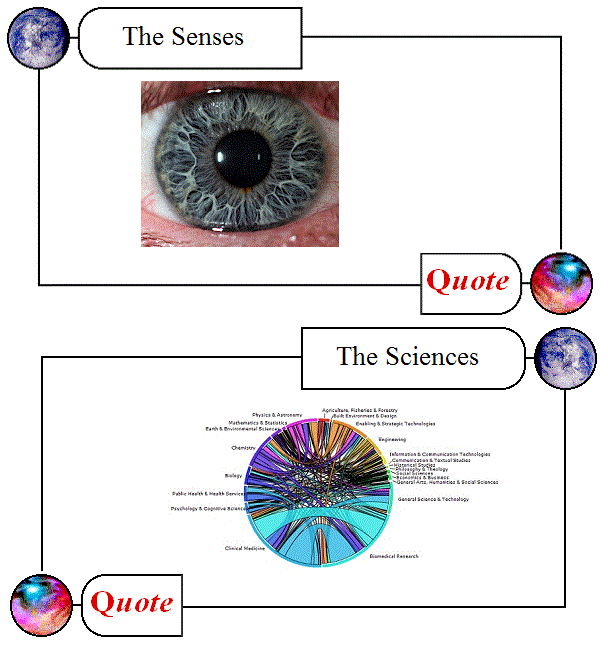France
An Iridology of the Sciences?
[ cross-posted from Zenpundit ]
I for one am delighted to know that we can now play around with the iridology of the sciences, using the software available on the Science-Metrix Ontology Explorer site to view which fields have journals which cross-link to journals in other fields…
Seriously — that lower image is of the Field Citation Wheel that you can find, suitably enlarged for easy viewing, on that site.
*
And it’s heartening for me to know, for instance — taking a closer look at the segment of that image that’s roughly east north-east — that scientific journals do have some links on their pages to works of theology or philosophy:
Engineering, you’ll notice, has more links than history, philosophy, theology, the social sciences (even counting them twice), economics, business, the arts and humanities combined.
My own field, theology, has to share its thin segment with philosophy, and you can guess how small the number of links to articles on Islamic apocalyptic probably are…
Which is, in part, why I wonder whether a project like the ETH’s Living Earth Simulator will really manage to map such things as, well, a possible outbreak of global jihadist Mahdism and its consequences.
*
But then I look at another gorgeous graphic from the same source, focusing in on a part of the network of knowledge that interests me, and I can just faintly make out, lower left, entirely isolated, the field of music…
What splendid isolation! That’s all of Bach, mind you and all the Beatles, too.
*
Seriously, though:
- It’s fascinating to be able to see how the various branches of knowledge cross-reference each other.
- Visual data representation is a gorgeous, fantastic, field.
- Mapping the all-of-everything is an irresistable lure for keen minds
- I’m betting the humanities will prove to be at least as good at it as the sciences.
- And I recall, not without a pang of regret, the time when my beloved Theology was Queen of the Sciences, and one might converse with Abelard on the streets of Paris…
Warriors of the Spirit
[ cross-posted from Zenpundit ]
It’s a very different approach…
I’ve been preparing to write up some of the episodes that represent how warm and close relations between Muslims and Christians can at times be the meeting of St Francis with the Sultan Malik al-Kamil, the period of considerable tolerance and artistic flourishing under Umayyad rule in Cordoba and I have to say I’m getting very impatient to see this film:

.
If you would like to understand why the Qur’an (5:82) says:
The nearest to the faithful are those who say “We are Christians. That is because there are priests and monks among them and because they are free of pride.”
May I recommend you either read John Kiser’s The Monks of Tibhirine: Faith. Love and Terror in Algeria — or, when it opens in your part of the world, go see Of Gods and Men. Or both.
Wishing us all peace in the new year, decade, century…
Tracking the Mahdi on WikiLeaks
[ cross-posted from Zenpundit ]
A quick search for “Mahdi” and “Mehdi” and “Twelfth Imam” in the 294 messages so far published in diplomatic Wikileaks reveals some references to individuals with those names, and a couple to Moqtada al-Sadr’s Jaysh al-Mahdi (spelled “Jaysh al-Madhi” in one cable by someone who is perhaps confused by the similarity of the name to that of Mahatma Gandhi), along with three cables in which Mahdism is touched upon.
1
09ASHGABAT1182 of September 16, 2009 reports a comment by an undisclosed source who is “adamant” that the US should not enter into direct talks with Iran’s leadership:
Not only, he insisted, is the Iranian leadership “untrustworthy,” and dominated by a group of “messianics,” who base crucial decisions about domestic and foreign policy on a belief in the imminent return of the “Missing” (Twelfth) Imam.
From my point of view, any foreign policy based on or strongly influenced by belief in the imminent return of a prophesied figure of good or evil, whether that figure be Moshiach or Christ or Mahdi, Antichrist or Dajjal, should be cause for concern: from a religious perspective, because messianic expectations are precisely what Matthew is talking about when he writes that “false Christs and false prophets will rise and show great signs and wonders to deceive, if possible, even the elect” (Matt 24.24) and from a secular perspective because such identifications have been made again and again across history, often with disastrous results (think Waco, think the 1979 siege of Mecca, think the Taiping Rebellion).
That’s why I’m interested in monitoring the various strands of apocalyptic thinking out and about in the world today.
2
A little over a month earlier, on August 3, 2009, 09RPODUBAI316 under the sub-head “A Benevolent Dictator’s Fall from Grace” discussed the idea that the “Arab street” (both Sunni and Shi’a are mentioned) initially saw some Mahdist qualities in Ahmadinejad:
A Syrian journalist and blogger, who owns a media consultancy firm in Dubai, believes that many in the Arab street initially viewed Ahmadinejad when he came to power in 2005 as a “benevolent dictator.” Citing the tradition of the Mahdi, the media consultant argued that both Shi’a and Sunni Arabs are taught from early childhood to await the arrival of a strong and unimpeachable figure who will lead the Muslim world. The media consultant maintained that even secular Arabs view the world, albeit unintentionally, with this ingrained mindset. Our contact argued that Ahmadinejad played in to this narrative, and when Ahmadinejad arrived on the international stage many Arabs saw him, in contrast to their own flawed leaders, as a humble and pious man who was brave enough to stand up for his people and the greater Muslim world by confronting Israel and the West head on. However, both the intensely competitive campaign period and the forceful reaction by the Iranian people to the official election results have led some moderate Arabs to rethink Ahmadinejad’s true disposition. The election, the media consultant said, led some Arabs to understand that despite his astutely crafted and well-marketed image in the Arab world, Ahmadinejad is resented by many Iranians for domestic mismanagement, incompetence, and corruption. Because of this public fall from grace, so the media consultant told us, Ahmadinejad is no longer the “untouchable, holy figure” in the Arab world he once was — his flaws have brought him down to the level of the Arab world’s own imperfect leaders.
I’m reminded of the way that Steve Davis of Charleston, SC, among others, projected messianic qualities onto then-candidate Obama, when he wrote:
Barack’s appeal is actually messianic, it’s something about his aura, his spirit, his soul, that exudes enlightenment in the making.
I interpret Obama’s Lebanon, NH remarks as making light of that sort of projection (McCain’s video makes light of it, too), whereas Ahmadinejad appears to take his own status within the aura of the Mahdi all too seriously.
3
The last reference allows me to end on a happier note.
The French diplo Jean-Christophe Paucelle is quoted in 09PARIS1046 of July 31, 2009 on the topic of Ahmadinejad’s inauguration.
First he mentions that since non-Muslims had not been invited to previous inaugurations, European members of the diplomatic corps might not know which door to take if they wished to walk out on the ceremony, should such an action be called for… and then he discusses an additional reason why the French would attend the ceremony, despite the contested nature of the election:
Paucelle said that the case of detained French citizen Clothilde Reiss has also influenced the EU decision to attend the inauguration ceremonies. “We think she may be released soon, and we don’t want to create another irritant,” Paucelle said. “There are enough already.” He reported that the French have reason to believe Reiss may form part of a group of detainees likely to be released on the August 7 anniversary of Imam Mahdi. Paucelle noted that a letter released July 29 by Ahmadinejad supported the idea of granting clemency to post-election protesters during Mahdi celebrations. “The Iranians will need to take face-saving measures, and so she will likely transfer to house arrest or some other status,” Paucelle said. He added that, of course, she may not be released at all next week, but the French remain optimistic that she will soon be out of prison.
Clotilde Reiss was indeed not released on that occasion — but she was in fact freed somewhat later, on Sunday, May 16th, 2010.
Size Matters
Earlier this decade, it seemed that the French government was doing their best to oppose the United States. Someone asked me why.
So I struggled to come up with a way to explain my impressions concerning the foreign policy of The Fifth Republic at the time, finally settling on describing a child that stomped around in a fury, shrilly shrieking “We used to be a world power!” over and over again.
The reason why this image came to mind was due to the fact that France, like most European countries, had allowed their armed forces to rot away to the point that they had a terrible time projecting force beyond their borders. This loss of military ability corresponds to a loss in influence on the world stage. Instead of biting the bullet and increasing their commitment to building and maintaining a world class force of arms, the French under Jacques Chirac appeared to be determined to browbeat the United States into acting as a proxy branch of their own government.
The point to the overly long diatribe above is that regimes and cultures which have their own interests at stake are not inclined to listen to what you have to say if there are no consequences for refusing to negotiate.
Such dusty history sprang to mind when I spied this news article on the UK Telegraph server. It appears that two new aircraft carriers planned for the Royal Navy might just be the victims of budget shortfalls.

(Picture source.)
The top brass, desperate to save the carrier project, have proposed cutting the British fleet in half!
“In a final appeal to the National Security Council, Navy chiefs yesterday offered to make cuts that would reduce the senior service to its smallest since the time of Henry VIII.”
“The Navy has argued that having two carriers is vital if Britain is to retain its place as a top-rank military power.”
There is nothing quite like an aircraft carrier for getting hostile regimes to sit up and play nice, and it is true that the United Kingdom needs these carriers if they are to retain their present level of influence on the future history of humanity. And yet, reducing the fleet to such anemic levels would make it impossible for Great Britain to meet commitments in other areas.
You could say that the Royal Navy is caught between the devil and the deep blue sea on this issue.
If there is one thing this proves, it is that the United Kingdom is not ready to meekly slide down the slippery slope into insignificance. Let us hope that such resolve is enough.
(Cross posted at Hell in a Handbasket.)



